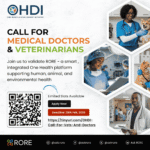Brief Program Statement:
- One Health encompasses the relationship between human health, animal health, and the health of the environment holding that these entities are inextricably linked to the extent that none can be optimal unless they are all optimal. One Health is interdisciplinary and inclusive; it invites the full participation of community members working together with scientists, health practitioners, tribal leaders, and government agency personnel to identify problems and create realistic, sustainable solutions to those problems. This program will provide knowledge and problem-solving skills for individuals who will be involved in managing One Health challenges at the community, state, federal, and international level. Implementing a constructionist approach and using the knowledge and skills developed in the coursework, students will finish the program with the creation of a management plan to address a problem that students and community members have identified. The plan will be presented to stakeholders and content experts in a public forum.
Mission Statement:
The One Health Master’s Degree (OHM) educates students to use a constructionist approach to address issues in the Circumpolar North that are at the intersection of human, animal, and environmental health. Graduates of the program will be able to engage key stakeholders to develop and implement realistic management plans that can be implemented in communities across the Circumpolar North.
Areas of concentrations:
We anticipate that this degree will attract students who are already engaged or interested in working in their communities to address One Health issues, and that it will also attract students seeking entrance to medical or veterinary schools who want to deepen their understanding of One Health and incorporate the paradigm and problem-solving skills into their future medical careers. For this reason, we propose two concentrations in the One Health Master’s: a Community Advocacy Concentration and a Biomedical Concentration.
The 19 credits in the core of this degree will provide training in communication, epidemiology, conflict resolution, cultural awareness, and skills for gathering pertinent data. The capstone sequence of courses (DVM F615, DVM F620, and DVM F621) will culminate in utilizing that knowledge and those skills to identify the root causes of a One Health problem and build a comprehensive management plan that addresses the root causes and proposes a realistic pathway to solving the problem.
This interdisciplinary, integrative, constructionist approach will involve One Health students working with key stakeholders and community members to identify the problem, interview key stakeholders and knowledge bearers in both traditional knowledge and western scientific knowledge, gather data from reliable sources, and, utilizing various planning techniques such as One Health SMART and scenarios building, create a management plan to address and solve or mitigate the problem.
Application deadline is July 15, 2022.





